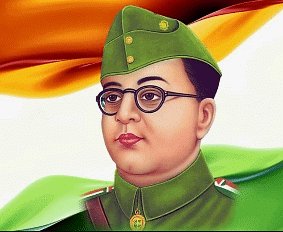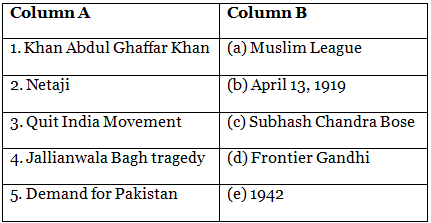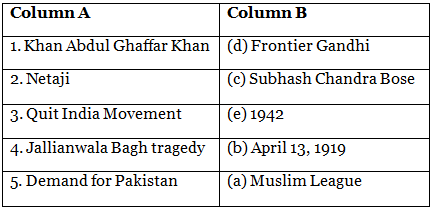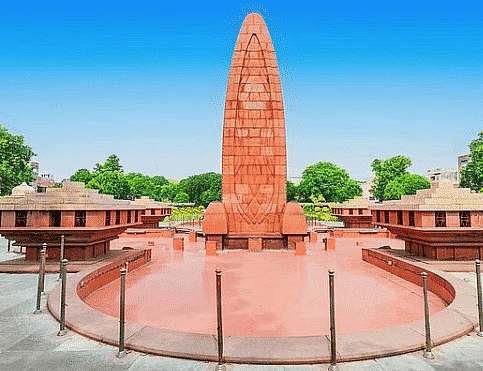India Wins Freedom - 1 Class 5 Worksheet SST
Q1: Multiple Choice Questions (MCQs)
(i) The session of the Indian National Congress, where Poorna Swaraj was demanded, was held in
(a) 1949
(b) 1929
(c) 1939
(d) 1947
Ans: (b)
The Indian National Congress, on 19 December 1929, passed the historic 'Purna Swaraj' – (total independence) resolution.
(ii) The Azad Hind Fauj was formed by
(a) Mahatma Gandhi
(b) Subhash Chandra Bose
(c) Mohan Singh
(d) Bhagat Singh
Ans: (b)
The Japanese Government honored him with the 'Order of the Rising Sun'. After Bose went into hiding in Japan, he established the Indian Independence League in 1942 and later handed over the command to Subhash Chandra Bose, it came to be known as the Indian National Army or the Azad Hind Fauj. (iii) The word Satyagraha was coined by
(iii) The word Satyagraha was coined by
(a) Mahatma Gandhi
(b) Jawahar Lal Nehru
(c) Lala Lajpat Rai
(d) None of these
Ans: (a)
Satyagraha, (Sanskrit and Hindi: “holding onto truth”) concept introduced in the early 20th century by Mahatma Gandhi to designate a determined but nonviolent resistance to evil.
Q2: True & False
(i) At the Lahore session, it was also decided to launch the Civil Disobedience Movement.
(ii) Dr. Rajendra Prasad became independent India’s third President.
Ans:
(i) True
(ii) False
EduRev Tips:
(i) The Lahore Congress of 1929 declared Poorna Swaraj as its aim and decided to launch the Civil Disobedience Movement.
(ii) Upon independence in 1947, Prasad was elected as President of the Constituent Assembly of India, which prepared the Constitution of India and served as its provisional parliament. When India became a republic in 1950, Prasad was elected its first president by the Constituent Assembly.
Q3: Fill in the blanks
(i) ________ turned his knighthood.
(ii) _________ gave the slogans ‘Dilli Chalo’ and ‘Jai Hind’.
Ans:
(i) Rabindranath Tagorere
(ii) Subhash Chandra Bose
EduRev Tips:
(i) Rabindranath Tagore returned 'the sir' (Knight hood) award to British government in 1918 to protest against the Jallianwala Bagh Massacre in which 379 innocent people died in the hands of British army.
(ii) Dilli Chalo" (meaning "On to Delhi!") and "Jai Hind" (meaning "Glory to India!") are famous slogans of Netaji Subhash Chandra Bose.
Q4: Match the following
 Ans:
Ans:
Q5: Give one word answer to the following.
(i) Where is Jallianwala Bagh situated?Ans: Jallianwala Bagh is a public garden in Amritsar in the State of Punjab and houses a memorial of national importance, established in 1951by the Government of India, to commemorate the massacre by British occupying forces of peaceful celebrators including unarmed women and children.

(ii) Who launched the Non-Cooperation Movement in 1920?
Ans: The Non-Cooperation Movement was pitched under leadership of Mahatma Gandhi and the Indian National Congress from September 1920 to February 1922, marking a new awakening in the Indian Independence Movement.
(iii) What was the popular slogan for the Quit India Movement?
Ans: On 8 August 1942, Mahatma Gandhi initiated the Quit India Movement or Bharat Chodo Aandolan from Bombay. Gandhiji gave the slogan “Do or Die” in his speech at the Gowalia Tank Maidan, now popularly known as August Kranti Maidan in Mumbai.
Q6: Short Answer Type Questions
(i) Who was the first Prime Minister and the first President of free India?Ans: Dr Rajendra Prasad (3 December 1884 – 28 February 1963) was an Indian independence activist, lawyer, scholar who served as the 1st President of India, from 1950 to 1962. The firstPrime Minister was Jawaharlal Nehru of the Indian National Congress party, who was sworn in on 15 August 1947, when India gained independence from the British Raj. Serving until his death in May 1964, Nehru remains India's longest-serving prime minister.
(ii) After which incident did Mahatma Gandhi start the Non-Cooperation Movement?
Ans: After an angry mob murdered police officers in the village of Chauri Chaura (now in Uttar Pradesh state) in February 1922, Gandhi himself called off the movement; the next month he was arrested without incident. The movement marked the transition of Indian nationalism from a middle-class to a mass basis.
(iii) What was the important decision taken during the Lahore session of Congress?
Ans: At the 1929 Lahore session of the Indian National Congress, the resolution of Poorna Swaraj for complete independence was taken up. It was also decided that the Congress would boycott the Round Table Conference being held in London and observe 26 January 1930 as the first independence day of India.
(iv) What do you understand by Satyagraha?
Ans: Satyagraha, (Sanskrit and Hindi: “holding onto truth”) concept introduced in the early 20th century by Mahatma Gandhi to designate a determined but nonviolent resistance to evil. By refusing to submit to the wrong or to cooperate with it in any way, the satyagrahi asserts that truth.
(v) Why was Simon Commission set up?
Ans: The Simon Commission was set up by the British government to report on the constitutional system and make recommendations for constitutional reforms in India. The Indians boycotted it with the slogan “Simon Go Back” all its seven members were the British and did not include any Indians.
|
33 videos|423 docs|50 tests
|
FAQs on India Wins Freedom - 1 Class 5 Worksheet SST
| 1. What is the book "India Wins Freedom" about? |  |
| 2. Who is the author of the book "India Wins Freedom"? |  |
| 3. What is the significance of "India Wins Freedom" in Indian history? |  |
| 4. What are some key events covered in "India Wins Freedom"? |  |
| 5. Is "India Wins Freedom" a reliable source for understanding India's struggle for independence? |  |
















